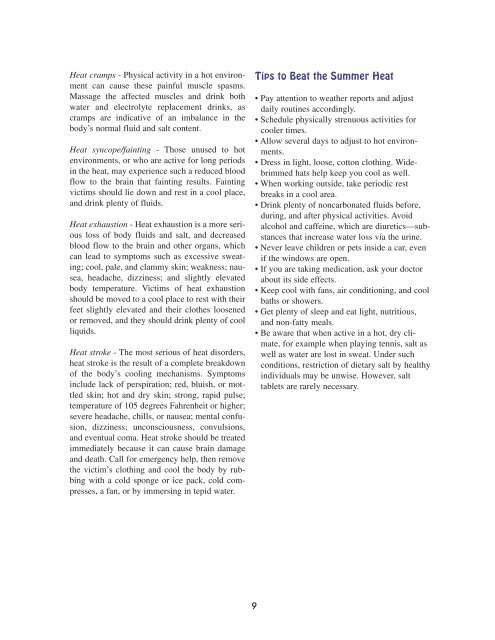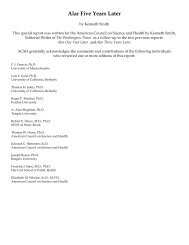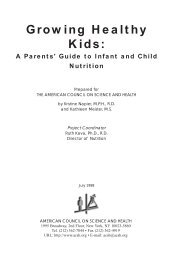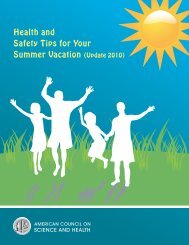View pdf - American Council on Science and Health
View pdf - American Council on Science and Health
View pdf - American Council on Science and Health
You also want an ePaper? Increase the reach of your titles
YUMPU automatically turns print PDFs into web optimized ePapers that Google loves.
Heat cramps - Physical activity in a hot envir<strong>on</strong>ment<br />
can cause these painful muscle spasms.<br />
Massage the affected muscles <strong>and</strong> drink both<br />
water <strong>and</strong> electrolyte replacement drinks, as<br />
cramps are indicative of an imbalance in the<br />
body’s normal fluid <strong>and</strong> salt c<strong>on</strong>tent.<br />
Heat syncope/fainting - Those unused to hot<br />
envir<strong>on</strong>ments, or who are active for l<strong>on</strong>g periods<br />
in the heat, may experience such a reduced blood<br />
flow to the brain that fainting results. Fainting<br />
victims should lie down <strong>and</strong> rest in a cool place,<br />
<strong>and</strong> drink plenty of fluids.<br />
Heat exhausti<strong>on</strong> - Heat exhausti<strong>on</strong> is a more serious<br />
loss of body fluids <strong>and</strong> salt, <strong>and</strong> decreased<br />
blood flow to the brain <strong>and</strong> other organs, which<br />
can lead to symptoms such as excessive sweating;<br />
cool, pale, <strong>and</strong> clammy skin; weakness; nausea,<br />
headache, dizziness; <strong>and</strong> slightly elevated<br />
body temperature. Victims of heat exhausti<strong>on</strong><br />
should be moved to a cool place to rest with their<br />
feet slightly elevated <strong>and</strong> their clothes loosened<br />
or removed, <strong>and</strong> they should drink plenty of cool<br />
liquids.<br />
Heat stroke - The most serious of heat disorders,<br />
heat stroke is the result of a complete breakdown<br />
of the body’s cooling mechanisms. Symptoms<br />
include lack of perspirati<strong>on</strong>; red, bluish, or mottled<br />
skin; hot <strong>and</strong> dry skin; str<strong>on</strong>g, rapid pulse;<br />
temperature of 105 degrees Fahrenheit or higher;<br />
severe headache, chills, or nausea; mental c<strong>on</strong>fusi<strong>on</strong>,<br />
dizziness; unc<strong>on</strong>sciousness, c<strong>on</strong>vulsi<strong>on</strong>s,<br />
<strong>and</strong> eventual coma. Heat stroke should be treated<br />
immediately because it can cause brain damage<br />
<strong>and</strong> death. Call for emergency help, then remove<br />
the victim’s clothing <strong>and</strong> cool the body by rubbing<br />
with a cold sp<strong>on</strong>ge or ice pack, cold compresses,<br />
a fan, or by immersing in tepid water.<br />
9<br />
Tips to Beat the Summer Heat<br />
• Pay attenti<strong>on</strong> to weather reports <strong>and</strong> adjust<br />
daily routines accordingly.<br />
• Schedule physically strenuous activities for<br />
cooler times.<br />
• Allow several days to adjust to hot envir<strong>on</strong>ments.<br />
• Dress in light, loose, cott<strong>on</strong> clothing. Widebrimmed<br />
hats help keep you cool as well.<br />
• When working outside, take periodic rest<br />
breaks in a cool area.<br />
• Drink plenty of n<strong>on</strong>carb<strong>on</strong>ated fluids before,<br />
during, <strong>and</strong> after physical activities. Avoid<br />
alcohol <strong>and</strong> caffeine, which are diuretics—substances<br />
that increase water loss via the urine.<br />
• Never leave children or pets inside a car, even<br />
if the windows are open.<br />
• If you are taking medicati<strong>on</strong>, ask your doctor<br />
about its side effects.<br />
• Keep cool with fans, air c<strong>on</strong>diti<strong>on</strong>ing, <strong>and</strong> cool<br />
baths or showers.<br />
• Get plenty of sleep <strong>and</strong> eat light, nutritious,<br />
<strong>and</strong> n<strong>on</strong>-fatty meals.<br />
• Be aware that when active in a hot, dry climate,<br />
for example when playing tennis, salt as<br />
well as water are lost in sweat. Under such<br />
c<strong>on</strong>diti<strong>on</strong>s, restricti<strong>on</strong> of dietary salt by healthy<br />
individuals may be unwise. However, salt<br />
tablets are rarely necessary.










